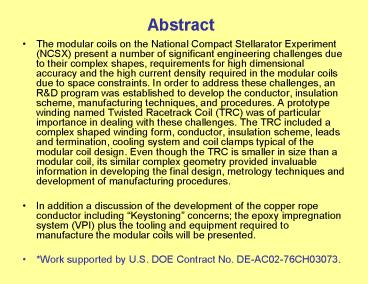Abstract PowerPoint PPT Presentation
Title: Abstract
1
Abstract
- The modular coils on the National Compact
Stellarator Experiment (NCSX) present a number of
significant engineering challenges due to their
complex shapes, requirements for high dimensional
accuracy and the high current density required in
the modular coils due to space constraints. In
order to address these challenges, an RD program
was established to develop the conductor,
insulation scheme, manufacturing techniques, and
procedures. A prototype winding named Twisted
Racetrack Coil (TRC) was of particular importance
in dealing with these challenges. The TRC
included a complex shaped winding form,
conductor, insulation scheme, leads and
termination, cooling system and coil clamps
typical of the modular coil design. Even though
the TRC is smaller in size than a modular coil,
its similar complex geometry provided invaluable
information in developing the final design,
metrology techniques and development of
manufacturing procedures. - In addition a discussion of the development of
the copper rope conductor including Keystoning
concerns the epoxy impregnation system (VPI)
plus the tooling and equipment required to
manufacture the modular coils will be presented. - Work supported by U.S. DOE Contract No.
DE-AC02-76CH03073.
2
NCSX Modular Coil Cutaway
3
RD Winding/VPI Development
.
-
4
Copper Conductor Keystoning
- New England Electric Wire Co. and the NCSX
Project worked together to develop the conductor
that would satisfy the projects needs - (7) Variations of conductor were fabricated and
evaluated during the RD phase - Minimizing the keystoning of the conductor as
well as achieving maximum copper density were (2)
of the primary goals with the selection of the
conductor.
- The compacted copper rope conductor selected is
0.342 in. x 0.383 in. (bare) /- 0.010 in.
tolerance - Material OFHC copper per ASTM B-577/ 34 gauge
wire 0.0063 in. dia. - Construction 12x5/54/34 cable, 3240 strands
- Nylon serve 0.004 inch thick was used on the
conductor. It helps during the manufacturing of
the conductor, as well as minimizing loose copper
strands during coil fabrication.
5
Keystone RD Findings
- Keystoning and tolerance control go hand in hand
during the manufacturing of the modular coils. - Minimizing Keystoning
- New turn to turn insulation scheme eliminating
Kapton tape - Setting conductor in position by gently hand
tapping in place - Using smaller conductor
- Sufficient number of winding clamps
- 3 inch centers
- Remove minimal number of clamps during winding
6
Conductor VPI Trials
- CTD-101 K 3 part epoxy system has been selected
to VPI the Modular Coils - Numerous VPI tests were performed
- Demonstrated good epoxy fill between individual
strands 0.0063 in. dia
Electron Microscope photos of epoxy filled
Conductor
7
Twisted Racetrack Shaped Coil (TRC)
- Twisted racetrack coil (TRC) captured many of the
physical features of the NCSX Modular coils
including geometry, cooling scheme, insulation,
conductor and coil leads.
- The fabrication of the TRC allowed final
development of - Tolerance control
- Manufacturing procedures final tool development
- Verification of VPI plan using the Autoclave
- Verification of thermal performance of the coil
- Training of key personnel
8
Dimensional Control Metrology
- To ensure stellarator symmetry, it is important
that the positions of the current centroids of
all the modular coils of each type are as similar
to each other as possible. /- 0.020 inch - The Romer measuring system will be used to
inspect the winding form and determine the
position of the coil bundle. - During winding, the coil width shall be fixed and
a constant torque of 30 inch-lbs will be used for
vertical height - After winding the bundle can be repositioned to
final dimensions - Glass tape lacing bands will be positioned on
either side of the winding clamps to control the
position of the turns during installation of
Groundwrap, chill plates and bag mold.
9
Cladding Chill Plate Development for Cooling
Modular Coils
3. Chill plates to cooling tubes soldered using
Stay-Brite rosin core Silver solder
1. Kapton backed Copper cladding is held in
position using 3M cement
2. Chill plates are installed and staked together
10
Brazing Cable Connectors
Brazing procedures had to be developed for
attaching the copper connectors to the cable rope
conductor
Argon Inert Gas Head
Nibco- Resistive heating Carbon Tongs used to
heat connector and cable
Water cooled chill blocks were used to contain
heat in the conductor during brazing
Sil-Fos braze rod being fed through end of
connector
11
Bag Mold for Epoxy Impregnation
A silicone bag mold with epoxy/glass shell was
developed and used as a mold for the epoxy
impregnation of the modular coils
12
Modular Coil Winding Facility
Special tools and equipment were developed to
manufacture the Modular Coils
Vertical Turning fixture for winding modular coils
Conductor Payout spool system - 4 conductor in
parallel
Autoclave Pressure/ vacuum oven
13
Modular Coil VPI System
14
Vacuum-Pressure-Impregnation Cure Cycle
15
Related NCSX Topics
- Poster Session III.b Wednesday 130- 300 PM
- B-5- NCSX Toroidal Field Coil Design M. Kalish,
and NCSX Team - B-8- Measurement of NCSX Modular Coil Composite
Conductor Material Properties T. Kozub, J.
Chrzanowski, S. Jurczynski - B10- Manufacturing Development of the Modular
Coil Windings for NCSX P. Fogarty and NCSX
Team - Oral Session
- Oral II.b Tuesday 1115 AM- NCSX Construction
Progress and Research Plans G. Neilson - Oral III.e Wednesday 330 PM-Production phase
for the NCSX Modular Coil Winding Forms P.
Heitzenroeder - Oral III.e Wednesday 400 PM-NCSX Vacuum Vessel
Fabrication M. Viola - Oral III.e Wednesday 420 PM-Engineering
Management Lessons on NCSX W. Reiersen

